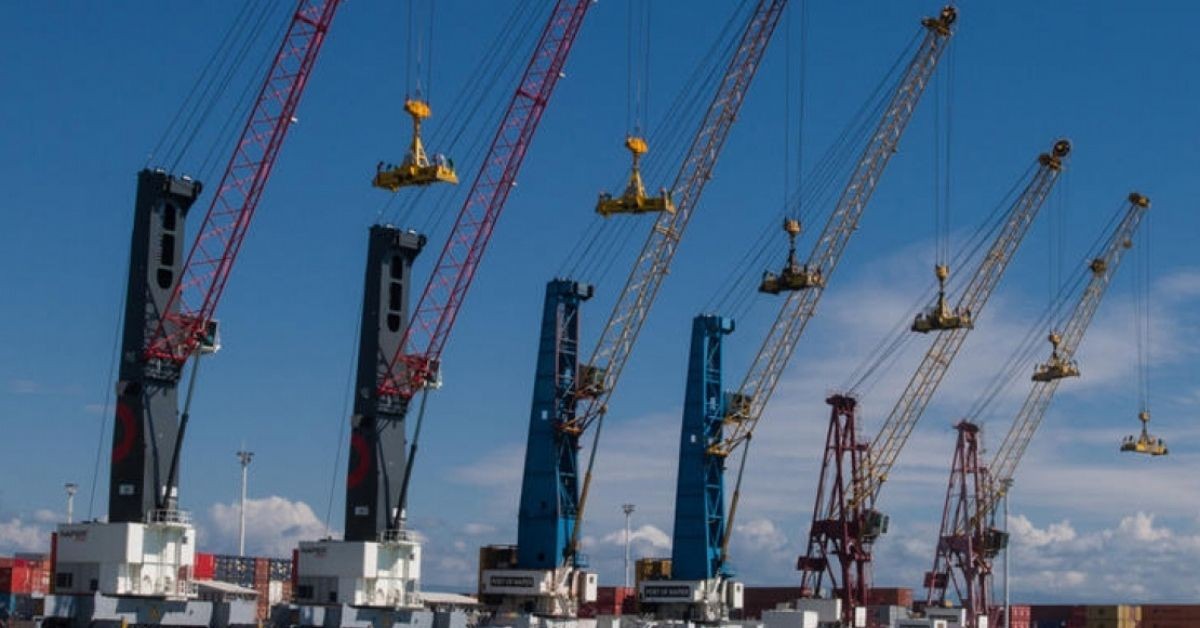India will supply four more mobile harbor cranes to Iran’s Chabahar Port by the end of June this year, a government official said on Friday.
In January, India supplied Chabahar Port a consignment of two mobile harbor cranes with a total contract value of $25 million, Press Trust of India reported.
Located in Sistan-Baluchestan Province on the energy-rich Iran’s southern coast, the port is being developed by India, Iran and Afghanistan to boost trade ties.
“For Chabahar, the available cranes are insufficient for conducting port operations. Two more cranes are standing for loading near the port near Venice, Austria, which will reach by March end to this port. Two more will reach by June end,” India’s Ministry of Ports, Waterways and Shipping (MoPWS) Additional Secretary Sanjay Bandopadhyaya said during a briefing on Maritime India Summit 2021 to be held from March 2-4.
MoPWS Secretary Sanjeev Ranjan, DG Shipping Amitabh Kumar and JNPT Chairman Sanjay Sethi were also present at the briefing.
Bandopadhyaya said after the mobile harbor cranes are delivered, there are plans to procure rail-mounted cranes for which bidding is going on.
“Till January 31, 2021, about 123 vessels have berthed at our terminal,” he said, adding that approximately 13,752 TEUs and 18 lakh tons of bulk/ general cargo have been handled there and efforts are going on to improve the traffic at Chabahar Port,” he added.
Since 2017, the official said India had sent consignment of 1.1 lakh tons of wheat, pulses and other assistance in over 4,800 containers to Afghanistan through Chabahar Port.
The bilateral contract between Iran and India was signed on May 23, 2016, with a total value of $85 million for equipping, mechanizing and starting operations at the port under the first phase.
In this regard, a special purpose vehicle – India Ports Global Ltd, Mumbai – was incorporated under the shipping ministry.
India’s Minister of Ports, Shipping and Waterways Mansukh Mandaviya said Chabahar is a strategic port with great national importance.
Chabahar Port Development
Development of Chabahar Port will help expand economic and mutual relations between India and Iran as well as boost maritime trade between both the countries.
The location of Chabahar Port has strategic advantage and high potential to provide connectivity among India, Iran, Afghanistan, Uzbekistan and other Commonwealth of Independent States countries, especially eastern CIS nations, and boost trade.
Chabahar has been a key connectivity project by India toward its west and provides connectivity via Iran to Afghanistan and beyond. India developed Shahid Beheshti Port at Chabahar as part of the India-Iran-Afghanistan 2016 agreement.
In December 2018, the India Ports Global Limited took over the port’s operations and as of August of 2020, the port has handled 1.2 million tons of cargo and 82,000 containers. In fact, India used the port to send 75,000 tons of wheat to Afghanistan as part of the humanitarian aid amid the Covid-19 pandemic.
Chabahar could prove to be a gateway to Central Asia and Eurasia. A year ago, the former US administration exempted India from sanctions for the development of the port because of the benefits it potentially had for both India and Afghanistan.
A former US administration official said, “We have provided a narrow exemption for the development of Chabahar that allows for the construction of the port and rail line that allows for the export of refined oil products to Afghanistan.”
381% Rise in Exports
Exports via the southeastern port of Chabahar has increased by 381% in the current Iranian year (started March 20, 2020) compared with last year’s corresponding period, Behrouz Aqaei, the head of Sistan-Baluchestan’s Ports and Maritime Organization, said.
“Agricultural products, livestock and meat exports saw a growth of 100% and exports of building materials increased by 748%,” he was quoted as saying by the news portal of the Ministry of Roads and Urban development without mentioning the volume or value of the exports.
Noting that Chabahar accounts for 9% of Iran’s total imports of essential goods since March 19, the official said, “Imports of essential goods, including wheat, barley, corn, rice, sugar and vegetable oils, from the country’s only oceanic port jumped by 71% year-on-year. The transit of agricultural commodities, food, and machinery through Chabahar increased by 95%.”
Iran-India-Uzbekistan Meeting
December saw the first India-Uzbekistan-Iran trilateral working group meeting on the joint use of the port for trade and transit purposes and enhanced regional connectivity.
Notably, Uzbekistan has built a rail link to Afghanistan to connect to Iranian rail network eying the use of Chabahar Port as an entry into the Indian Ocean region. Uzbekistan is among two doubly landlocked countries in the world. The other being Liechtenstein.
Over the past five years, buoyed by economic reforms, Uzbekistan is seeking to increase its Indian Ocean outreach to break away from its landlocked status.
New Delhi will be inviting Afghanistan for the next meeting. India is also pursuing the inclusion of Chabahar port in the International North-South Transportation Corridor.
INSTC is a major transit route designed to facilitate the transportation of goods from Mumbai in India to Helsinki in Finland, using Iranian ports and railroads, which the Islamic Republic plans to connect to those of Azerbaijan and Russia.
The corridor will connect Iran with Russia’s Baltic ports and give Russia rail connectivity to both the Persian Gulf and Indian rail network. This means goods could be carried from Mumbai to the Iranian port of Bandar Abbas and further to Baku. They could then pass across the Russian border into Astrakhan before proceeding to Moscow and St. Petersburg, before entering Europe.
INSTC would substantially cut the travel time for everything from Asian consumer goods to Central Eurasia’s natural resources to advanced European exports.
Source : Financial Tribune







